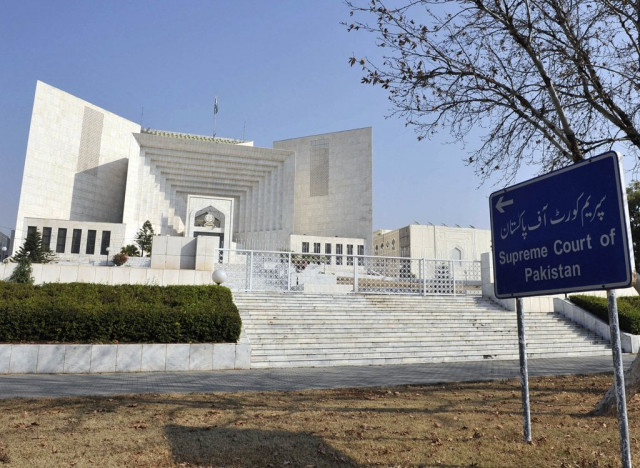SC rejects post-arrest bail of woman in narcotics case
Court says likelihood of such offence being repeated by petitioner can’t be ruled out

Referring to the scope of bail in narcotics cases, the top court has held that the offences relating to such incidents were of such a nature that did indicate the likelihood of the repetition of the crime by the suspect.
"Dealing in narcotic drugs is usually the business of the persons involved therein, and is not a spontaneous or one time act, and the women are often involved in it as carriers for the transportation, supply and sale of narcotic drugs,” read a four-page judgment authored by Justice Syed Mansoor Ali Shah.
The court rejected post-arrest bail of a woman involved in a narcotics case.
“The likelihood of such an offence being repeated by the petitioner cannot, therefore, be ruled out. The case of the petitioner thus comes within the scope of the exception of likelihood of repeating the offence,” the verdict added.
A division bench of the apex court led by Justice Qazi Faez Isa heard the post-arrest bail petition of the woman.
The allegation against her is that police caught her and her co-accused each carrying 1,005 grams of methamphetamine — psychotropic substance, also referred to as “ice”.
The judgment noted that reliance of the counsel for the petitioner on Tahira Batool case was misconceived.
Also read: Court defers Sanaullah’s indictment in drugs case
In the present case, the court observed that “the persons involved in the commission of offences of robbery or dacoity are usually the professional criminals and there is a likelihood that they would repeat the offence if enlarged on bail”.
“[That] distinguished the case of Tahira Batool, the woman accused in the case, because she was employed in the house of the complainant as a maid,” the judgment read.
"Had this distinguishing fact not been there, her [Tahira's] case might also have fallen within the exception of likelihood of repeating the offence because of the nature of the offence of robbery,” it added.
The court noted that the offence alleged against the petitioner was punishable with death, imprisonment for life or imprisonment up to 14 years, and thus fell within the prohibitory clause of Section 497(1) of the Code of Criminal Procedure (CrPC).
“Perusal of record would reveal that the accused-petitioners have been arrested red-handed on the spot and a considerable quantity of contraband Ice was recovered from her personal possession, but no plausible explanation has been offered by the accused in respect of the narcotics substance,” the verdict stated.
"The recovery memo is duly supported by marginal witnesses who were present on the spot with the seizing officer. No ill-will or malafide has been shown by the petitioner on the part of police to have been implicated falsely in the instant case. The two courts below, therefore, formed an opinion, though tentative, that there was sufficient incriminating material available on record of the case that prima facie connected the petitioner with the commission of the alleged offence,” it added.
"We do not find their concurrent opinion to be perverse or arbitrary, which could have justified interference by this court. The petitioner has thus not been able to make out a case of further inquiry for grant of bail in an offence of prohibitory clause, under Section 497(2) [of the] CrPC,” the SC judgment read.
Also read: LHC dismisses post arrest bail of alleged bhang smuggler
“However, the petitioner being a woman her prayer for post-arrest bail should also have been examined under the first proviso to Section 497(1) [of the] CrPC, if she was not found entitled to bail under Section 497(2) [of the] CrPC, as held by this court in [the] Tahira Batool case. The courts below have not adverted to it. We therefore proceed to examine the prayer of the petitioner for bail under the said proviso, in the interest of justice,” it added.
"Under the first proviso to Section 497(1) [of the] CrPC, grant of bail is a rule and refusal an exception, as held in [the] Tahira Batool case, in a case where the accused is a minor under the age of 16 years, a woman, or a sick or infirm person, even in a non-bailable offence of prohibitory clause, in the same manner as bail is granted or refused in offences of non prohibitory clause of Section 497(1) [of the] CrPC,” the court observed.
"Thus, we are to only examine, whether the case of the petitioner falls within any of the three settled exceptions to the rule of granting bail, which are the likelihood of the accused: (a) to abscond to escape the trial; (b) to tamper with the prosecution evidence, which includes influencing the prosecution witnesses; or (c) to repeat the offence,” it added.
The judgment stated that this court had described three circumstances in the Tahira Batool case that might be considered for deciding, whether or not there is a likelihood of repeating the offence by the accused, which are: (i) their previous criminal record, (iii) nature of the offence, or (iii) manner of committing the offence.
"These circumstances are, as held by this court in Iftikhar Ahmad v. State only illustrative in character, and not exhaustive, and the courts may take into consideration ‘some other striking circumstance that impinges on the proceedings of the trial, or poses a threat or danger to the society' and thus brings the case of an accused within any of the said three settled exceptions to the rules,” the court concluded.



















COMMENTS
Comments are moderated and generally will be posted if they are on-topic and not abusive.
For more information, please see our Comments FAQ